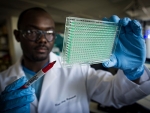Displaying items by tag: school of medicine
Doctoral student Kwaku Osei came to UAB to learn from top researchers in the dry eye field. His work focuses on a tear film component that could provide a new way to treat a growing vision problem.
Tagged under
Using SeamlessMD, UAB Medicine provides patients with a digital experience through which they can access information about their surgeries via cellphone, tablet or computer — from surgery preparation to the recovery process.
Tagged under
This finding may point to a therapeutic target to treat tuberculosis, which kills 1.3 million people each year.
Tagged under
A team of UAB palliative care experts will provide a culturally based palliative care program provided through telehealth in three rural hospitals in the Southeast, and compare that to patients receiving regular care, to see if it helps reduce suffering for patients, increases patient and family quality of life, and reduces the burden of care for caregivers.
Some 130 public research universities and systems pledge to work collaboratively to increase college access and eliminate the achievement gap.
Tagged under
Tagged under
An animal model for mild traumatic brain injury shows microscopic neuropathology, as well as neurophysiological and biochemical changes.
Tagged under
The annual wreath-laying ceremony, hospital celebration and potentially historic UAB football game are all part of Veteran’s Day weekend.
Tagged under
All academic areas saw increases in grant award monies from November 2017 through October 2018 as the university continues to grow its mission.
Tagged under
A new oral antibiotic medication has been determined to be successful in the treatment of uncomplicated urogenital gonorrhea.
Tagged under
In an effort to protect the health of our patients and staff this flu season, certain visitor restrictions and precautions will be in place at UAB.
Tagged under
A group of women who range from ages 30-80 formed a support group with one another in their breast cancer fight in an effort to live life to the fullest.
Tagged under
Tagged under
Findings show that mitochondrial DNA may strongly influence cellular metabolism and susceptibility to metabolic diseases like heart failure or obesity.
Tagged under
After a series of breakthroughs that researcher Steven Rowe calls "one of the most remarkable stories in modern medicine," the majority of patients with cystic fibrosis can now be treated with highly effective therapies. The next step: adapting these treatments to COPD, asthma and a host of other conditions.
Tagged under
Tagged under
Tagged under
Tagged under
A summer learning program from UAB and HudsonAlpha will help boost the ranks of underrepresented minorities in genomics.
Tagged under
New wearable health monitoring devices can help you stay informed, but should they be relied on heavily?
Tagged under



















